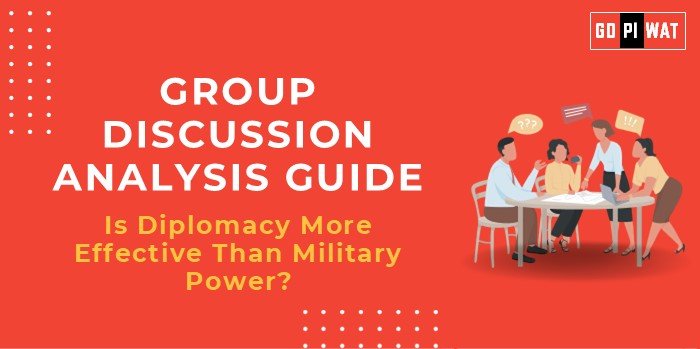📋 GD Analysis: Is Diplomacy More Effective Than Military Power?
🌐 Introduction to the Topic
Opening Context: In a world where geopolitics is becoming increasingly complex, the debate over whether diplomacy or military power holds greater efficacy in resolving global conflicts remains pivotal.
Topic Background: Historically, both diplomacy and military force have shaped the global order. Post-World War II diplomacy led to the United Nations’ formation, while military interventions have defined conflicts like Iraq and Afghanistan. In today’s multipolar world, nations employ a mix of soft power and hard power, underscoring the relevance of this discussion.
📊 Quick Facts and Key Statistics
🤝 UN Peacekeeping Missions: Active in 12 regions – Showcases diplomacy’s role in conflict resolution.
🔗 NATO Membership: 31 countries – Highlights alliances balancing diplomacy and military strategies.
🏛️ Diplomatic Missions Globally: ~163 by the USA – Underlines diplomatic reach as a tool of soft power.
🧑💼 Stakeholders and Their Roles
- Governments: Use diplomacy for treaties and military for national defense.
- International Organizations: UN, NATO, and others mediate disputes and authorize interventions.
- Private Sector: Influences diplomatic decisions through economic interests.
- Civil Society: Advocates for peaceful conflict resolution and human rights.
🎯 Achievements and Challenges
Achievements:
- Diplomacy Success: The Iran Nuclear Deal (2015) averted potential conflict.
- Military Power Impact: NATO interventions restored peace in Bosnia (1990s).
- Combined Efforts: Ukraine war responses showcased diplomatic sanctions paired with military aid.
Challenges:
- Diplomacy Failure: UN’s limited success in the Syrian conflict.
- Military Overreach: Prolonged wars in Iraq and Afghanistan with questionable outcomes.
- Global Comparison: Switzerland thrives on diplomacy, while the USA combines both approaches.
- Case Study: The Abraham Accords (2020) – A diplomatic breakthrough in Middle Eastern relations.
💬 Structured Arguments for Discussion
- Supporting Diplomacy: “Soft power strategies reduce human and economic costs, fostering sustainable peace.”
- Supporting Military Power: “Military might ensures immediate security and deters aggression.”
- Balanced Perspective: “A combination of diplomatic engagement and military readiness ensures a holistic approach.”
📝 Effective Discussion Approaches
Opening Approaches:
- Statistical Start: “With $2.4 trillion spent globally on military, can diplomacy achieve more with fewer resources?”
- Quote-based: “As Churchill said, ‘Jaw-jaw is better than war-war.’ How relevant is this today?”
- Contrast Approach: “While diplomacy prevented Cold War escalation, military force resolved the Gulf War.”
Counter-Argument Handling:
- Challenge military reliance with cases like Vietnam.
- Question diplomacy’s efficacy using Syria as an example.
🔍 Strategic Analysis of Strengths and Weaknesses
- Strengths: Diplomacy fosters alliances; military ensures immediate deterrence.
- Weaknesses: Diplomacy can delay action; military might lead to prolonged conflicts.
- Opportunities: Globalized mediation frameworks; hybrid peace-keeping models.
- Threats: Rising nationalism; risks of arms races.
🏫 Connecting with B-School Applications
Real-World Applications: Crisis management in corporate mergers mirrors diplomatic strategies.
Sample Questions:
- “Discuss a situation where soft skills triumphed over aggression.”
- “Is ethical leadership in business analogous to diplomacy in geopolitics?”
Insights for Students: Developing negotiation skills; understanding geopolitical risks in global business.


